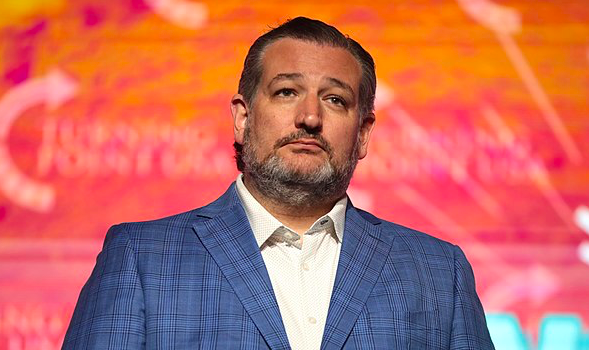
Despite recent subfreezing temperatures and tens of thousands of Texans again going without power, Sen. Ted Cruz, R-Texas, appeared to have stayed put rather than again fleeing to Cancún. He did make headlines, however, by plopping his weighty legal mind down on the propriety of President Joe Biden’s campaign promise to nominate the first Black woman to the U.S. Supreme Court.
Biden reiterated that pledge January 27, when Justice Stephen Breyer announced his intent to retire at the end of the court's current term after nearly three decades in the robes. As ranking member of the Senate Judiciary Committee, Cruz will vet and question whomever Biden picks.
"The fact that Biden's willing to make a promise at the outset that it must be a Black woman — I gotta say, that's offensive," Cruz said, reacting to the news on his podcast The Verdict. "Black women are what — 6% of the US population? He's saying to 94% of Americans, 'I don't give a damn about you, you are ineligible'. And it's actually an insult to Black women. If he said, 'I'm going to put the best jurist on the Court,' and he looked at a number of people and ended up nominating a Black woman, he could credibly say, 'OK, I'm nominating the person who is most qualified'. He's not even pretending to say that. He's saying, 'If you're a white guy, tough luck! If you're a white woman, tough luck, you don't qualify!' It's an example of how for Democrats, and particularly the far Left, everything's race, that they will discriminate based on race. They will pigeonhole you, they don't care about the individual."
Religious conservatives adore pretense. Does anyone believe Clarence Thomas' race was wholly irrelevant when President George H.W. Bush's picked him to fill the vacancy left by civil rights legend Thurgood Marshall in 1991? Apparently Republicans such as Cruz entitle themselves to take credit for promoting diversity, so long as they don't publicly admit that's what they're doing — and then pivot to stoking white racial resentment whenever politically convenient.
The patron saint of the GOP, Ronald Reagan, and Mango Mussolini himself, Donald Trump, similarly pledged to appoint women to the Supreme Court. Yet this blatant "gender discrimination" didn't offend Cruz at the time. It didn't signal that Reagan and Trump were telling all men in America, "I don't give a damn about you."
So, despite all their disingenuous race-baiting, Republicans do seem to grasp the importance of the highest court in the land looking at least somewhat like the nation affected by its decisions.
The real insult to Black women is that out of 115 justices to sit on the High Court, only two have been Black, only five have been women and not one in 233 years has been both.
And that's why it remains difficult to regard right-wing proponents of so-called colorblind meritocracy in good faith: they know full well that an all-white, all-male Supreme Court — even if arrived at by happenstance on supposedly race-neutral, gender-neutral hiring criteria — wouldn't fly today. And rightly so.
If the problem is not our perception of color or the multiplicity of religions and ethnicities which comprise the American mosaic, why should the solution be "colorblindness" instead of a recognition and affirmation of our differences?
Anyone who reads these columns has likely figured out that I concur with Clarence Thomas about next to nothing. Yet I fully concede he's eminently qualified for his job and that his credentials can't be separated from the life experience he's brought to the bench.
Though one might legitimately criticize how well Thomas represents African American women in particular, to reductively characterize his appointment as "a diversity hire" — as Cruz's podcast sidekick, Michael Knowles, referred to Biden's pending nominee — is truly offensive.
Take the 2003 case of Virginia v Black. By 7 to 2, the High Court held that Virginia's ban on cross-burning was an unconstitutional violation of freedom of expression unless specifically tied to "an intent to intimidate."
In an evocative dissent, the only Black justice stood alone in arguing that cross-burning wasn't a First Amendment question at all but a matter of “violent and terroristic conduct” and “physical threat.” He cited historical documentation that referred to the Ku Klux Klan as “the world’s oldest, most persistent terrorist organization” and wrote, “In our culture, cross-burning understandably instills in its victims well-grounded fear of physical violence. Considering the horrific effect cross-burning has on its victims, it is reasonable to presume intent to intimidate from the act itself.”
Agree with his legal reasoning or not, that perspective is informed by first-hand knowledge of the painful legacy of racism, and that's a perspective every academic institution, every corporate boardroom and every governmental body in this country still needs to hear and reckon with.
Openly acknowledging and starting with that principle of inclusion is not racist to white people, nor does it squash individuals into racial caricatures. On the contrary, it entails respecting every individual down to the fullness of their roots.
Stay on top of San Antonio news and views. Sign up for our Weekly Headlines Newsletter.
















